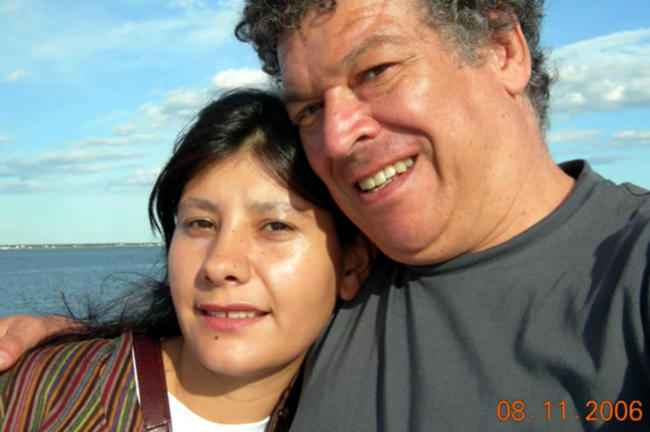
I had already agreed to guest edit a selection of fiction for Guernica earlier this summer. Then, on July 24th, at the beach in Mazunte, Mexico, my wife Aura Estrada suffered a fatal swimming accident.
Of course, along with just about everything else in my life, everything work-related stopped, was canceled, postponed. But finally, I decided I wanted to do this, which like everything else I decide to go ahead with for now, is another way of remembering and honoring Aura.
Friends of Aura contributed all of these fiction selections. It’s as simple as that.
Friends of Aura contributed all of these fiction selections. It’s as simple as that. It so happens that most of them, maybe all of them, would have been included in my original roster, though under another rationale such as: excellent fiction by writers young and slightly less young—or by new young writers and new new young writers (Aura’s short story “An Open Secret” is about a writer invited to a New New Young Writers’Congress.)
I imagine most of Guernica’s fiction readers are familiar with the work of Susan Choi and Ernesto Mestre-Reed, who have both contributed excerpts from their forthcoming soon-to-be-published novels. It really is an honor to be able to include works from two of the contemporary fiction writers I most love and admire: risky, beautifully-written, politically sharp. Bex Brian has published one novel, Promiscuous Unbound, with Grove Press. I think this excerpt from her new novel, 456 Victoria, about three half-sisters growing up in three separate households in Westmount, Canada, in the 1970s, is a thrilling delight and surprise.
Rivka Galchen and Jay Caspian Kang Kang were students in a workshop I taught at Columbia MFA program a few years ago. I used to look forward to their classroom submissions as eagerly as if their in-process-novels were appearing serially in a magazine I’d subscribed to. Now those projects are completed novels. Rivka’s will be published this spring by Farrar Straus and Giroux. We became friends, partly, or even greatly, because they really wanted to be friends with Aura, much closer in age to them than I am, and because they really admired what they had read of Aura’s, especially her essay, “Borges, Bolaño, and the Return of the Epic,” published at Words Without Borders.
Gabriela Jauregui is one of Aura’s best friends from Mexico City. Living on opposite coasts, Gaby in California, Aura in New York, their impossibly busy lives mirrored one another’s: in New York City, Aura was simultaneously pursuing a PhD in the department of Spanish and Portuguese literature at Columbia University and an MFA at Hunter’s graduate writing program, and Gaby, living in LA, was doing her PhD in Comp Lit at Southern Cal and her MFA at Riverside. Gaby, who writes poetry and fiction, seems to have decided to become an English language writer, and will soon be publishing a collection of poetry with Akashic Books. Aura and Gaby, along with the bilingual poet Monica de la Torre (who was also at Columbia with Aura) and the visual artist Laureana Toledo, were the founders of the Taquimecanógrafas collective, an experimental writing-image project they had been collaborating on for a few years, and which has resulted in an extraordinary text-art-object that is sure to be published in Mexico.
Aura, this summer, had decided that she was probably going to write her fiction in Spanish. But she loved studying under Peter Carey and Colum McCann at Hunter, and as anybody who visits Aura’s Hunter Memorial Website can see even in her English language writings, her voice, her intelligence, her humor and spirit, and so much else that is harder for me to put into words right now, are radiantly conveyed.
On the morning of the day she suffered her accident in the waves, Aura left these two paragraphs on her computer screen:
Are There Signs in Life?
As a little girl my parents and I used to spend Christmas vacations in a small town in the south of the United States. We would take a road trip that could last three or four days depending on the family’s budget and mood. We always crossed the border long after dusk. As soon as the fading reflections of the interrogation lights and the barking of the Doberman, whose drooling fangs sometimes gnawed on my dreams, as soon as that nightmare of passports and documents—the quasi-magical click of the stamp authorizing our entrance—was behind us, the landscape would turn dark and abysmal for one or two kilometers, as if the world had disappeared for a few moments before the first marquees with their pretty red and white lights dancing in space like frenzied diamonds would appear, fulfilling the night and our expectations after the exhausting drive. Back then, as a girl, contemplating the dance of those lights through the rear window of our Caribe ’87, I would imagine the existence of a secret and shared communication code.Via some device, I would think, exhaling my breath onto the glass made grimy by the drive, every one of the lights comprising that luminous perimeter of signs for 24-hour supermarkets, Spanish music radio stations and bank ads, were being synchronized in order to form a specific and particular pattern, a choreography that might be developing from right to left, or from left to right, from the top down or from the bottom up, according to the whims of an anonymous publicist whose purpose I couldn’t yet imagine.”
Here, in the work of these wonderful writers who all loved my beloved Aura, we have “a secret and shared communication code” that commemorates what Aura most loved: LITERATURE . . . uncompromising, written by people who write as if they believe that nothing matters more, and best of all, here, written by her friends. — Francisco Goldman